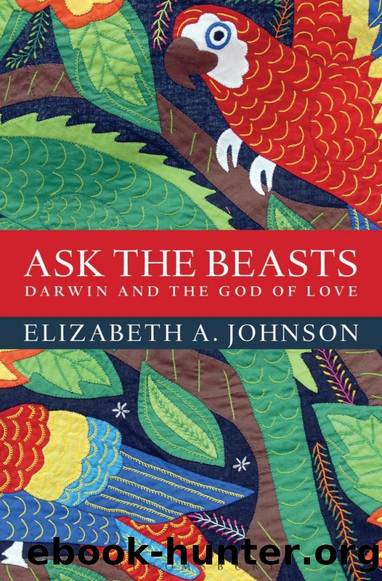Ask the Beasts: Darwin and the God of Love by Elizabeth A. Johnson

Author:Elizabeth A. Johnson [Johnson, Elizabeth A.]
Language: eng
Format: epub
ISBN: 9781472903730
Google: tDszAgAAQBAJ
Amazon: 1472903730
Barnesnoble: 1472903730
Goodreads: 18719722
Published: 2013-09-13T06:05:04+00:00
For all Christian theology, the gospel is good news. The love of God is a saving, healing, restoring power that benefits human beings.
F R E E , E M P O W E R E D C R EAT I O N 157
A significant stream of theological interpretation parses this to mean that divine love ultimately enhances the powers of the human person rather being a zero-sum game in which one protagonistâs gain is the otherâs loss.
Consider these writers, who share a similar intuition:
Ð â Irenaeus penned a classic statement of the God-human relationship with the phrase, Gloria Dei vivens homo, âthe glory of God is the human being fully alive. â2 Godâs own honor is at stake in human flourishing, to the point where whenever human beings are violated or their life is drained away, divine glory is dimmed; whenever human beings are quickened to fuller and richer life, divine glory is enhanced. Tying the glory of God so closely to human well-being expresses a precise understanding of the love of the creating, redeeming Mystery as generous, generative, seeking the good of the beloved and having a stake in it.
Ð In exploring the relation between divine grace and human freedom, Bernard of Clairvaux reflected a similar understanding of how the Creatorâs love enhances human autonomy: âWhat was begun by grace alone, is completed by grace and free choice together, in such a way that they contribute to each new achievement not singly but jointly; not by turns, but simultaneously. It is not as if grace did one half the work and free choice the other; but each does the whole work, according to its own peculiar contribution. Grace does the whole work, and so does free choice â with this one qualification: that whereas the whole is done in free choice, so is the whole done of grace. â3
Ð The same profound intuition about divine graciousness runs through Karl Rahnerâs insight that nearness to God and genuine human autonomy grow in direct and not inverse proportion. Put in other words, radical dependence on God and the genuine reality of the creature increase to the same degree.4 The claim arises in view of Jesus Christ, whom doctrine declares to be truly human as well as truly divine. The deep union of his human nature with divine nature did not render Jesus a robot but constituted him a genuine human being with the integrity of his own freedom. From this central point Rahner reasons that the same dynamic holds true for all human beings.
Because grace relates human persons profoundly to the source and goal of their very lives, they become more themselves and can act more freely when they respond to Godâs gracious self-gift than when they are afar off.
158 A S K T H E B EA S T S
Take these insights about human experience of grace that run through Catholic theology from the second to the twelfth to the twentieth century and extend them to the origin of species.
Download
This site does not store any files on its server. We only index and link to content provided by other sites. Please contact the content providers to delete copyright contents if any and email us, we'll remove relevant links or contents immediately.
The Secret Power of Speaking God's Word by Joyce Meyer(3152)
Signature in the Cell: DNA and the Evidence for Intelligent Design by Stephen C. Meyer(3121)
Real Sex by Lauren F. Winner(3001)
The Holy Spirit by Billy Graham(2937)
The Gnostic Gospels by Pagels Elaine(2515)
Jesus by Paul Johnson(2347)
Devil, The by Almond Philip C(2322)
23:27 by H. L. Roberts(2241)
The Nativity by Geza Vermes(2220)
Chosen by God by R. C. Sproul(2151)
All Things New by John Eldredge(2149)
Angels of God: The Bible, the Church and the Heavenly Hosts by Mike Aquilina(1948)
The Return of the Gods by Erich von Daniken(1925)
Angels by Billy Graham(1915)
Knowing God by J.I. Packer(1844)
Jesus of Nazareth by Joseph Ratzinger(1797)
The Gnostic Gospel of St. Thomas by Tau Malachi(1779)
How To Be Born Again by Billy Graham(1775)
Evidence of the Afterlife by Jeffrey Long(1773)
